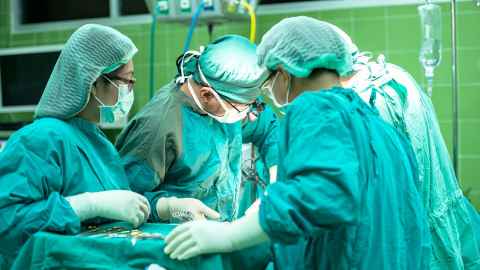Doctoral study in Surgery

Why study with us?
- We offer a range of excellent opportunities for full time research.
- Our research encompasses laboratory science, translational research and clinical trials.
Research opportunities
Doctoral research in Surgery falls under one of the following themes:
General surgery
A general surgeon is a specialist who is trained to manage a broad spectrum of surgical conditions affecting almost any area of the body. The surgeon establishes the diagnosis and provides the preoperative, operative, and post-operative care to patients and is often responsible for the comprehensive management of the trauma victim and the critically ill patient.
Subspecialties within general surgery include:
- Upper gastro-intestinal
- Hepato-pancreatic-biliary
- Colorectal
- Breast and endocrine
Cardiothoracic surgery
Cardiothoracic surgery involves the operative management, perioperative care, and critical care of patients with pathological conditions within the chest. It includes surgical care for coronary artery disease, cancers of the lung, esophagus, and chest wall, abnormalities of the great vessels and heart valves, congenital anomalies, tumours of the mediastinum, and diseases of the diaphragm.
Neurological surgery
Neurological surgery is the discipline of medicine and the specialty of surgery that deals with the diagnosis, evaluation, and treatment of disorders of the central, peripheral, and autonomic nervous systems, including their supporting structures and vascular supply. Neurological surgery involves the evaluation and treatment of pathological processes that modify the function or activity of the nervous system, including the pituitary gland.
Otolaryngology head and neck surgery
These are surgeons who investigate and treat conditions of the ear, nose, throat, and neck. These include the evaluation of hearing difficulties, sinus conditions, voice problems, cancer of the throat, snoring and nasal and facial plastic surgery.
Paediatric surgery
Paediatric surgeons are primarily concerned with the diagnosis, preoperative, operative, and postoperative management of surgical problems in children and they operate on children whose development ranges from the newborn stage through the teenage years.
Orthopaedic surgery
Orthopaedic surgery is specifically devoted to the care of the musculoskeletal system, including bones, joints, muscles, associated nerves, arteries, and the overlying skin. Much of the orthopaedic surgeon's practice involves the performance of surgical procedures, but many conditions are treated medically or physically through the use of braces, casts, splints, or physical therapy.
Plastic and reconstructive surgery
Plastic surgery deals with the repair, replacement, and reconstruction of defects of the form and function of the body covering and its underlying musculoskeletal system, with emphasis on the craniofacial structures, the oropharynx, the upper and lower limbs, the breast, and the external genitalia. This surgical specialty also focuses on the aesthetic surgery of structures with undesirable form.
Urology
A urologist is a physician who manages benign and malignant medical and surgical disorders of the adrenal gland and of the genitourinary system. Urologists have comprehensive knowledge of, and skills in, endoscopic, percutaneous, and open surgery of congenital and acquired conditions of the reproductive and urinary systems and their contiguous structures.
Vascular surgery
Vascular surgeons care for patients with diseases that affect the arteries and veins throughout the body. Vascular surgeons must deal with many problems in arteries and veins, such as atherosclerosis, aneurysms and blood clots, and deal with their after-effects.
Our people
Professor Andrew Graham Hill
Professor Andrew Graham Hill won the the Gluckman Medal in 2016 for his outstanding contributions to research, education and service. He has supervised 20 postgraduate students and one of these, Dr Tarik Sammour, won a University of Auckland Best Doctoral Thesis Award in 2012. Professor Hill’s students have won more than 30 prizes or scholarships for their research regionally and internationally. He has also mentored seven Māori or Pacific junior doctors in research towards a PhD and was awarded the 2016 RACS Māori Medal for this work.
Among many awards accorded, Professor Hill was awarded the 2014 University of Auckland Teaching Excellence Award for Research Supervision and the Royal Australasian College of Surgeons (RACS) premier research award, the John Mitchell Crouch Research Fellowship.
Professor Hill has more than 200 peer-reviewed papers with a focus on Medical Education and Perioperative Care. He also is a Reviewer for 30 journals including the British Medical Journal, The Lancet, Medical Education, British Journal of Surgery and Annals of Surgery.
Scholarships and awards
You may be eligible for a scholarship when you decide to pursue doctoral study.
Contact us
Do you want to chat further about your studies? Get in touch with Student Hubs.